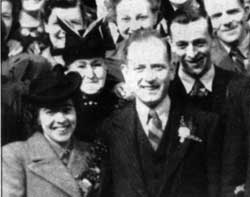7 September 2006 Edition
Remembering the Past
BY SHANE Mac THOMÁIS

Charlie on his wedding day
Charlie McGlade
Charlie McGlade was born in Belfast in 1909 and lived in the Bone area of north Belfast. The Easter Rising in 1916 and the Proclamation of the Irish Republic, followed by the execution of the leaders, made an indelible impression on the young McGlade. During the years of the Tan War he became a member of Na Fianna Éireann and educated about the history of Ireland's struggle for independence.
When he joined the ranks of the IRA in 1927, Charlie fully understood Ireland's position, after the Tan War, the Treaty betrayal and the Civil War. For Charlie there was no question but that the struggle for freedom had to continue.
As adjutant of 'C' Company in the IRA's Belfast Battalion in Ardoyne from 1931, McGlade proved himself to be a capable administrator and organiser. During these years he helped the development of Na Fianna Éireann in his area, appreciating that Irish youth must be educated in Ireland's history, culture and language. He impressed on all the company's Volunteers that the weekly parades and gun lectures of those years were essential for the future fight.
When he was later promoted to quartermaster of the Belfast Battalion, all arms and explosives came under his jurisdiction and he found new sources of supply for the IRA's arsenals. The responsibility of any quartermaster is very grave and Charlie by his swift and intuitive military intelligence saved many dumps from capture.
A severe setback was experienced by the IRA in 1936 when the Crown Entry raid took place as the result of an inside tip-off to the RUC. Three GHQ officers, all the staff of the Belfast Battalion and the commandants of the counties of Armagh, Tyrone, Derry and Donegal were arrested.
All including McGlade were charged with 'treason felony' and sentenced to terms of between two and seven years. It was McGlade's intelligence and sound deductions which brought the informer in the Crown Entry raid to justice.
On release from Crumlin Road jail in 1938, McGlade was sent on a tour through Britain for some months - ostensibly to raise funds for the Movement. In the same year a massive round-up by the RUC took place in Belfast. The whole of the Belfast Battalion staff, and many company officers and Volunteers, were arrested and interned.
Charlie McGlade escaped that raid because the RUC still believed he was in England. Under his direction the IRA in Belfast was re-organised. The bombing campaign commenced in England in 1938, and selected Volunteers were sent south for training and then posted to England for operations. On Charlie's insistence the Northern Command staff was set up and he was appointed its O/C. Jimmy Steele, who had just been released from Crumlin Road jail after five years of imprisonment, became adjutant and Sean McCaughey was appointed quartermaster. Detailed planning began, with the objective being to take the field in the six occupied counties.
In 1940 Charlie stepped down as O/C Northern Command and appointed Sean McCaughey to the position. He made this decision because he saw that McCaughey had outstanding qualities of initiative and leadership, combined with an analytical mind and high intelligence.
That year came the fall of France and the retreat of the British from Europe. Their losses were heavy in arms and equipment and their military barracks in the Six Counties were guarded by soldiers armed with pick-axe handles instead of rifles.
Charlie McGlade as command quartermaster ordered Ballykinlar Barracks to be raided. A supply of arms was seized.
McGlade and McCaughey notified GHQ of the military situation in the North and pressed for supplies to commence the operation against British forces.
McGlade was in the unique position of being able to observe over the years the conduct of GHQ. Suspicions were growing. It is not possible to recount here the labyrinth of detail of events that made it imperative for three officers of the Northern Command McGlade, McCaughey and Liam Rice - to arrest the then IRA Chief of Staff, Stephen Hayes, on 30 June, 1941 at Coolock, County Dublin.
Sean McCaughey was arrested in August 1941 and taken before a military court in Dublin's Collins Barracks, charged with the kidnapping of Stephen Hayes. He refused to recognise the court, was convicted and sentenced to death. In the face of the outcry raised against the savagery of the sentence, the Free State authorities commuted it to life imprisonment. Five years later Sean McCaughey died on hunger and thirst strike in Portlaoise Prison.
In October 1941 Charlie, by then on GHQ, was shot and wounded by Special Branch men in Wolfe Tone Street in Dublin and interned in the Curragh concentration camp until the end of the Second World War.
On his release he continued working for a United Ireland. He supported the campaign in the 1950s and in 1970 was on the caretaker executive of Sinn Féin, following the split in the republican movement. He remained as Sinn Féin treasurer until 1981 and was still on the Ard Chomhairle at the time of his death.
Charlie died on Friday 17 September 1982. His funeral drew a huge crowd of mourners from all walks of life. It passed down Mourne Road in Dublin, draped in the Tricolour and black beret, to a Requiem Mass where the Furey Brothers played laments to this proud Irish soldier.
- On Saturday, 16 September Volunteer Charlie McGlade will be commemorated. Assemble at 3.30pm at Dolphin Road/Mourne Road Green (canal end). Speaker: Aengus Ó Snodaigh TD. The Irish Brigade will play that night in the Marble Arch, Drimnagh.


